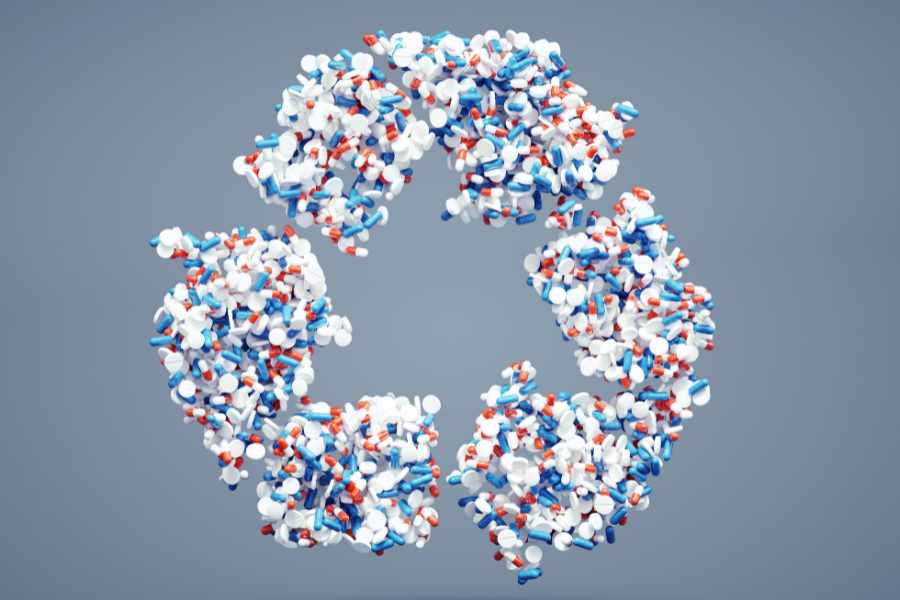
CEO Mark Costa said the company’s second chemical recycling plant has already received its first funds from the Department of Energy, amid uncertainty for federal funding for Inflation Reduction Act projects. | Petrmalinak/Shutterstock
Amid uncertainty surrounding projects funded through the Inflation Reduction Act, the CEO of Tennessee-headquartered Eastman expressed confidence in the future of its second U.S. chemical recycling plant, which was greenlit upon a $375 million award from the Department of Energy.
“Our project’s under contract with the DOE, and we’ve already received our first funds from the program, and so we feel like we’re on a good track there,” said CEO Mark Costa during the company’s investor call Jan. 31. During a November investor event, executives had expressed less certainty about the project in Longview, Texas. He didn’t mention the proposed chemical recycling plant in France during the call.
With regards to tariffs, Costa said today’s global manufacturing economy is weaker than during the 2019 trade war with China, and many countries are in a weaker position. “So it’s not clear to me how much more negative impact tariffs can have on top of the manufacturing recession we’re already in.”
And in the absence of specific tariff actions, “there’s no way for me to estimate the impacts at this stage,” he said during the call, which took place the day before President Donald Trump announced tariff actions against Canada, Mexico and China effective Feb. 4; those against Mexico were later postponed. “But I will say that our forecast does not include any significant impact from the trade actions.”
So far, Eastman has not yet seen an impact from regulatory and funding uncertainty, Costa said. However, the challenging macroeconomic environment has forced consumers to choose more carefully how they spend their money, which has slowed Eastman customers’ adoption of recycled resin. Instead Eastman’s customers are focusing on launching new products to help grow market share in a challenging environment, Costa said.
The company has more than 100 customers using Renew resin in durable goods, he said, “and they’re already paying premiums for those products.”
Nevertheless, the company doesn’t see a long-term shift away from brands using more sustainable plastics. “The reality is, the brands are very focused on the brand equity and consumers’ engagement around their products, and consumers really don’t like plastic waste,” Costa said.
“The NGOs, the media are still very much going after plastic waste,” he said. “In many states, they’re more committed post-election to driving this agenda with what choices they can make at the state level. And regulations are certainly coming out in Europe that are driving and forcing change as well as in multiple states in the U.S. So I don’t think that context is changing.”
Texas project aligns with Trump priorities
Costa said Eastman’s project “fits perfectly” with Trump’s agenda in three areas: building a resilient U.S. supply chain, creating energy independence and moving the U.S. toward a competitive advantage in managing end-of-life plastics.
The company’s Kingsport methanolysis plant produces plastics for food packaging, durable goods and medical devices, items Costa said the U.S. needs to produce to increase supply chain resiliency. He added that Eastman’s investments “create jobs in revenue for recycling infrastructure that feeds into this kind of facility and the others that need to be built in this country, and that creates a sustainable growth not just in Texas but across the country.”
As for energy independence, “plastic waste is basically oil sitting above ground in landfill,” he said. He said using that plastic as feedstock provides an advantaged cost position when crude oil is above $60 per barrel. In its January Short-Term Energy Outlook, the U.S. Energy Information Administration forecast global benchmark Brent crude oil prices to average $74 per barrel in 2025 and $66 in 2026, compared to $81 in 2024, as global oil production is expected to grow more than demand.
Building U.S. recycling infrastructure also helps advance long-term competitive advantage in creating a circular economy – which Costa defined as using local end-of-life plastics as feedstock.
“Imports obviously shouldn’t count as recycled content, because that’s solving someone else’s waste problem, not ours. And whether you’re Republican or a Democrat, no one likes plastic waste, they all want it solved,” he said. “Even Trump signed a Save our Seas Act in the first-term showing that marine debris and impacts to the environment are important to him on this topic.”
He added that “obviously, we’re paying very close attention to the new administration.”